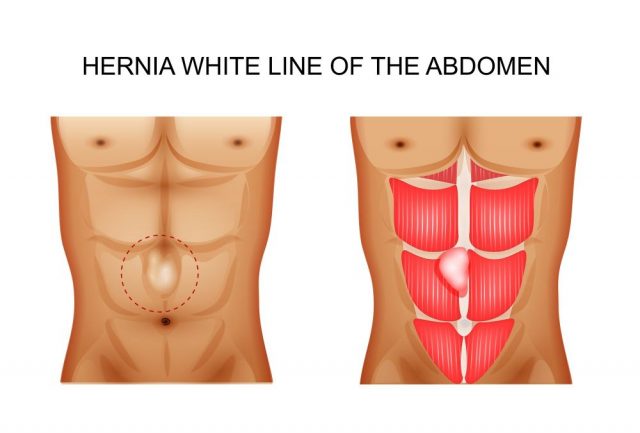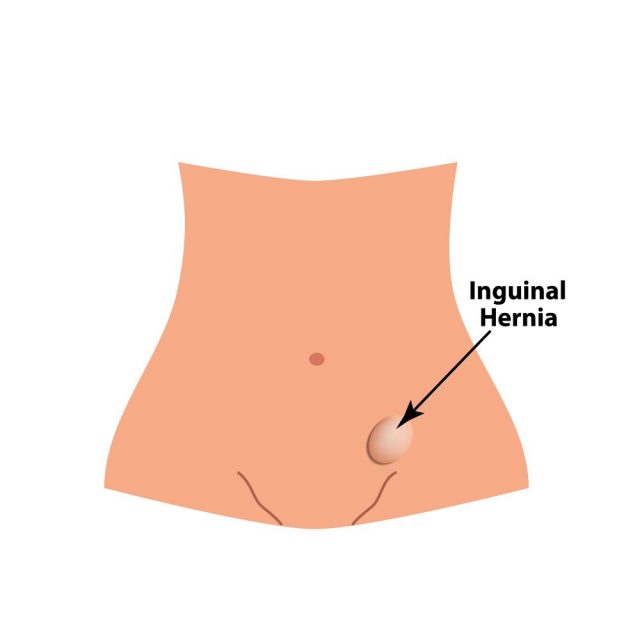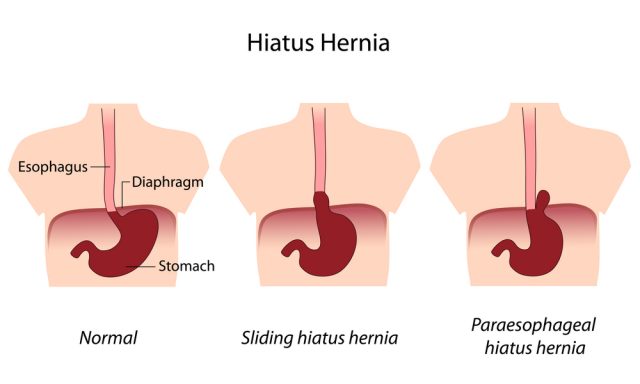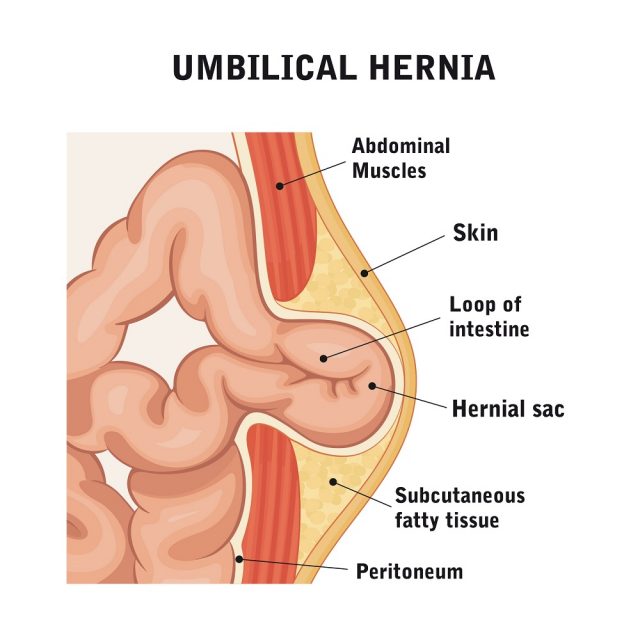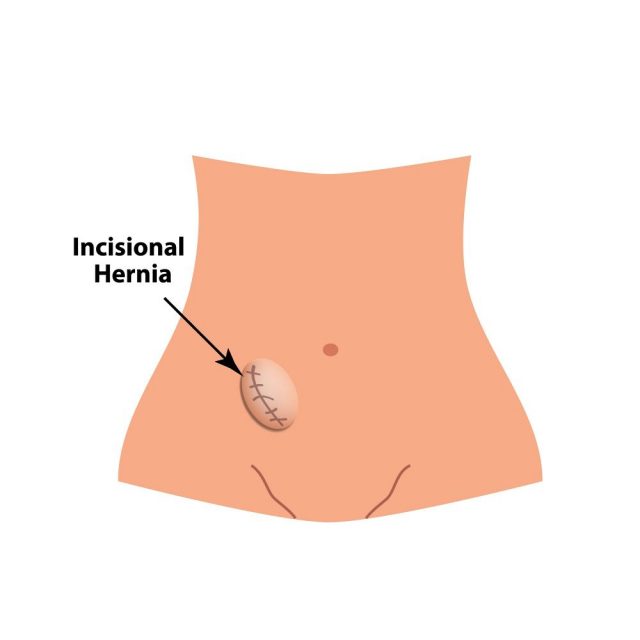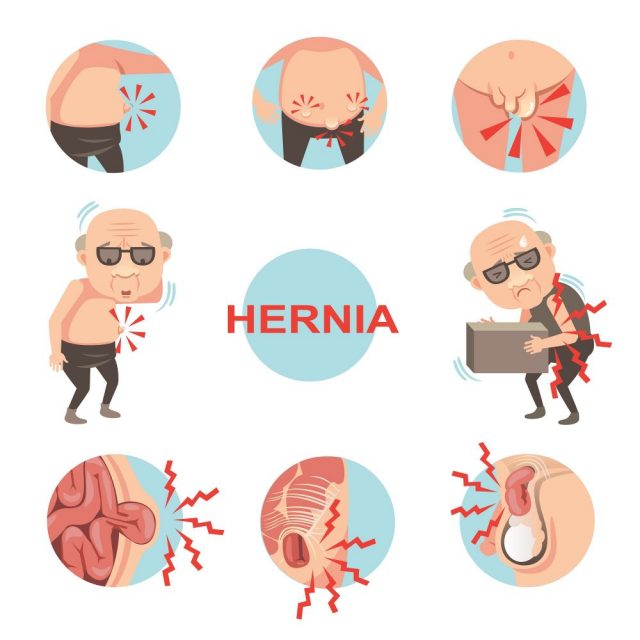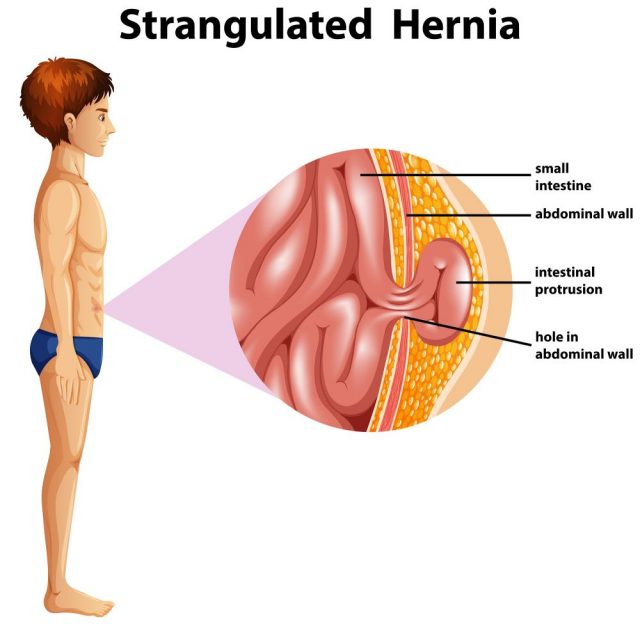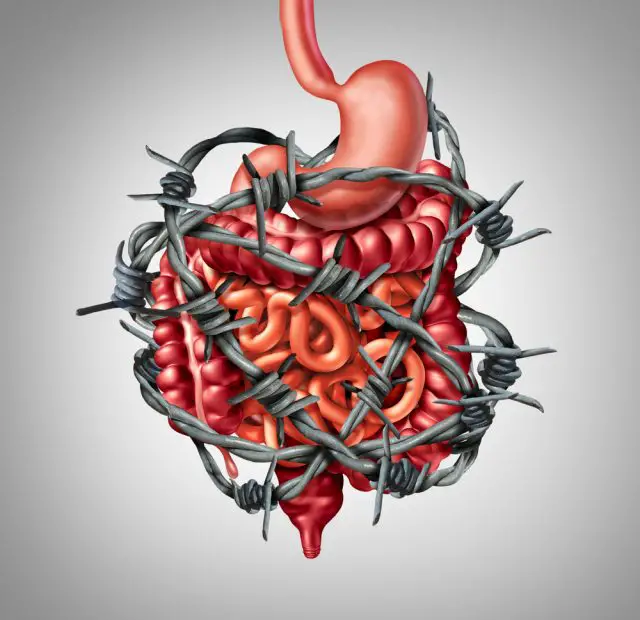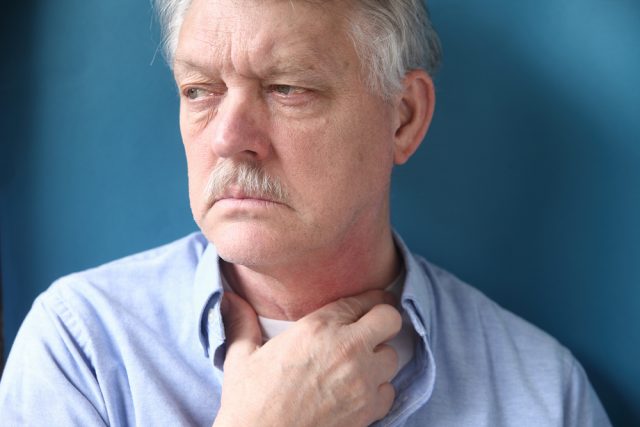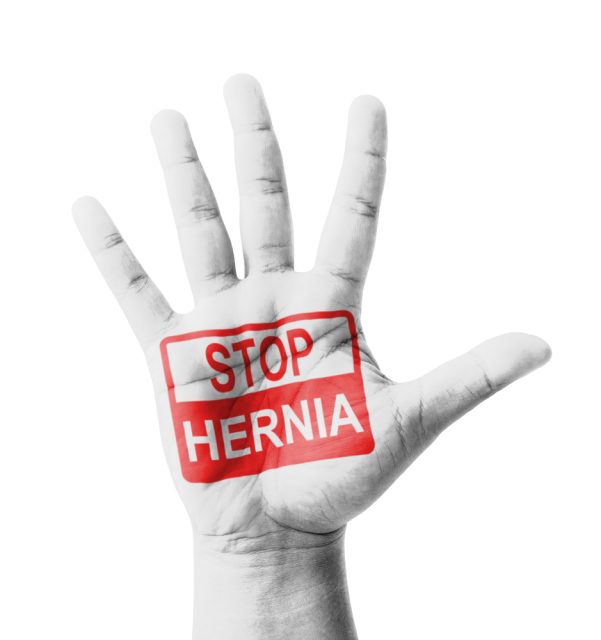Hernia Symptoms in a Male
The internal tissues and organs in the human body are separated into several compartments. Some weakness in these separating walls can cause the development of a hernia. Note that it is a medical health condition where an organ pushes out through small openings of tissues or muscles. One common example of this state is breakthrough of intestines through the weakened area of the abdominal wall.
Medical reports reveal that most cases of a hernia are reported in abdomen area; however, it can also appear in the belly button, upper thigh or groin area. Although we cannot call a hernia as a life-threatening disease, the true fact is that patients cannot get rid of discomfort caused by a hernia without appropriate treatment. Patients need to undergo some surgical procedures to deal with the complications.
Types of Hernia
This is the most commonly reported type of hernia, and its occurrence rate is 70% as compared to all other types of hernias. Inguinal hernia occurs when intestine breaks through the weak spot or simply tears down the lower abdominal wall. It is often found in inguinal canal hence the name is inguinal hernia. Note that in men, inguinal canal is present in the groin, the area through which spermatic cords makes the connection from the abdomen to the scrotum. Cases of this type of a hernia are reported more in men as compared to women because man’s testicles move down through inguinal canal right after their birth and the canal stays behind it. In case if the canal is not closed appropriately, it may leave some weakened area behind that later becomes the cause of a hernia.
Hiatal hernia is reported when a part of stomach extends through the diaphragm into the chest cavity. Note that diaphragm is actually a sheet of muscles that assist humans in breathing by expanding and contracting their lungs. It also helps to separate the organs of the abdomen from the chest area. Hiatal hernia symptoms are reported in people above 50 years age group. Few most commonly observed symptoms of this hernia are gastroesophageal reflux and burning sensation.
The sad fact is that this type of hernia can occur in children and even in babies below the age group of 6 months. In case of umbilical hernia, intestine cause eruption through abdominal wall near bellybutton and this swelled area is visible when a child is crying. However, the good news is that this is the only type of hernia that gets treated itself with time when the muscles of the abdominal wall become stronger. The symptoms may be completely reversed when the child becomes around 1 year old. In case if it doesn’t go automatically, you may have to undergo surgical procedures to correct it.
Incisional hernia can occur after some kind of abdominal surgery. There are chances that intestine tries to push through incision scar or any other weakened tissue in the surrounding area. It may cause discomfort with time when symptoms become active. Few other reasons behind incisional hernia are pregnancy, obesity, excessive pressure caused by sneezing or coughing, heavy weight lifting, or due to overexcretion that exerts an unwanted force on tissues, organs, and muscles through existing surgical wound.
Symptoms of Hernia in a Male
- Acute Pain:
One of the most commonly observed symptoms of hernia is acute onset pain at the location of hernia. This pain is often caused when extreme pressure is exerted on muscles, nerves around hernia and peritoneum. When the internal organs and fat try to move deeper into the small hole of the muscle that is named as hernia, the nerves and muscles in the nearby area suffer pressure with pain. When the hernia is pushed back, the pain also gets reduced as the pressure on nerves and muscles get reduced.
- Bulges Under the Skin:
As you know, hernia develops when the internal organs or fats press deep into the muscle holes or weak points. In such conditions, the bulge under the skin is a most common symptom of this disease. The force exerted by internal organs at affected site force skin over hernia to swell out. When patients make efforts to change the body posture and hernia goes back inside by releasing the force on muscle, the bulge also disappears. However, if the body pushes again in this direction where hernia finds its way to muscle hole, the swelling may appear again. As long as the hernia is able to travel back and forth with changes in body posture, the bulge may keep on appearing and disappearing, but once the hernia gets locked inside the muscle hole, the hernia becomes incarcerated. In this condition, internal organs fail to push it back to the original position. Most cases of hernia report presence of this bulge but few patients may not have this hernia symptom.
- Chronic Pain:
Reports say that some types of hernia develop with time, so they do not cause acute pain that is already described as one of the potential symptoms of hernia. When the hernia keeps on rising in slow motion, it causes tension on nerves and muscles around the hernia hole. Many people face throbbing, burning and aching sensation with generalized discomfort due to this chronic growth of hernia. Note that this pain is quite different as compared to the acute pain because it is not that intense and sharp rather it stays like a dull ache and keep on interfering in routine activities of the patient.
- Referred Pain:
The moment when nerves present in groin area get stretched due to the presence of a chronic or acute hernia, the patient may face irritation in the entire length of nerves. This irritation further causes severe pain that may radiate to the areas above and below the location of actual hernia. When a patient is suffering from groin hernia, the pain can be extended to the lower abdomen, upper thigh, or even up to testes in men. This irritation and pain continue even when the hernia moves out of the muscle hole. In this case, as actual pain is not present at the site of hernia, a person may suffer burning sensation, pressure, aches and much discomfort.
- Nausea and Vomiting:
Hernia symptoms also include nausea and vomiting, and they can vary from mild to severe depending upon the type of hernia. Studies reveal that when symptoms are mild, they are caused by the trapping of a small portion of intestine inside the hernia hole. However, the surprising fact is that nausea may come and go as the hernia keep on popping in and out of the muscle hole. The on and off cycle of intestinal blockage leads to symptoms like vomiting and nausea, but they are always not permanent. If you suffer from such symptoms, again and again, it is better to contact hernia specialist as soon as possible.
- Strangulation:
One of the most common symptoms of hernia is strangulation. It is observed when some portion of the intestine is trapped inside muscle hole/hernia, and it is not able to move out to get its position back in the abdomen. In this condition, the blood supply to this particular section of intestine gets blocked, and it further disrupts the flow of blood in the whole intestine. Indeed, this blockage causes severe pain to the patient along with vomiting and uncontrollable nausea. This symptom of hernia is much easier to recognize due to its severity. Patients can easily identify this state of hernia, and they need to undergo immediate surgery with the help of hernia experts.
- Constipation:
Like vomiting and nausea, constipation is also a common symptom of hernia. When the piece of intestine gets trapped or blocked inside the hernia, it disturbs the passage of food, and this condition further leads to chronic constipation. Although this symptom is also common in many other diseases as well; if you are suffering from hernia, it is important to consult medical health professionals as soon as to avail right treatment.
- Difficulty in swallowing:
When intestine gets trapped inside hernia, along with blood supply, food supply also gets interrupted. In this situation, the person also feels difficulty in swallowing. One may even suffer more pain while eating food. Some patients also report heaviness in abdomen, pressure, and weakness in the affected area.
Possible treatments for hernia
If you are suffering from hernia, it is important to contact trusted medical health professionals as soon as possible so that disease can be treated on time. Below we have highlighted few possible treatments for hernia that can provide positive results:
- Lifestyle changes:
One of the most recommended solution to make hernia go away is dietary changes. It is better to avoid heavy and large meals and don’t bend right after eating a meal. Make more efforts to maintain your body weight. Few exercises are capable enough to improve the strength of muscles at hernia site; however, they must be performed as per the guidance of some professional trainer otherwise they may exert wrong pressure on the affected area. However, in case if these changes are not enough to ease your discomfort, it is better to contact medical health professionals for suitable medication and surgical procedures.
- Medications:
Patients suffering from hiatal hernia are more likely to avail desirable treatment with few trusted prescription medications. The target is to reduce acid level in the stomach that can further release the discomfort by reversing the symptoms. Some of the most commonly used medications include proton pump inhibitors, H-2 receptor blockers, and antacids. However, it is important to follow the guidance from medical health professionals for right treatment and suitable medications.
- Surgery:
In case if your hernia is causing severe pain and it seems to be growing larger, the best idea is to treat it via surgery. The hernia specialists may repair the hole in the muscles or tissues by sewing it so that hernia spot in the abdominal cavity can be closed. It is possible to repair hernia with laparoscopic or open surgery that is completed with miniaturized surgical equipment and tiny camera. Experts believe that laparoscopic surgery has a least harmful impact on surrounding tissues. On the other side, the open surgeries need a long time for recovery, and it may also cause post-surgical pain. Some reports also reveal that although laparoscopic surgery is least painful and ensures fats recovery, there are chances of reoccurring of hernia. Also, it is not possible to recover all types of hernia using laparoscopic surgery.
Tips to prevent hernia
Prevention is always better than cure, and in order to stay safe from discomfort and troubles caused by hernia, it is better to follow some expert tips:
- Stop smoking.
- Consult your doctor if you develop cough time and again.
- Make efforts to avoid obesity and overweight.
- Develop a habit of lifting objects with your knee instead of exerting pressure on your back.
- Avoid lifting objects that appear too heavy for your abilities.

